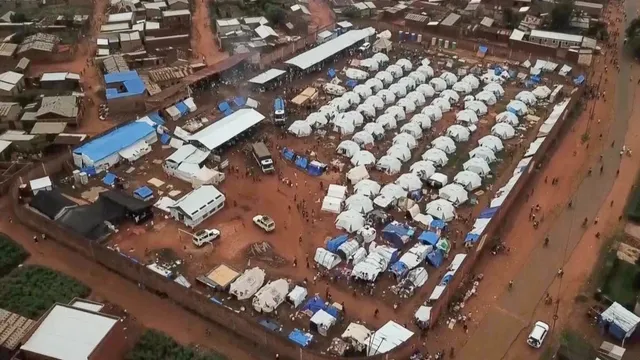
Burundi faces refugee crisis as fighting in eastern Congo escalates
2025-03-24 22:55- Burundi is experiencing a significant rise in refugees due to ongoing violence in eastern Congo.
- Over 120,000 registered refugees now require food assistance, with many being women and children.
- The humanitarian crisis necessitates urgent international support to assist those affected by the conflict.
Express your sentiment!
Insights
Burundi has recently experienced one of its largest influxes of refugees in decades as ongoing violence in eastern Congo has driven tens of thousands to seek refuge. The U.N. World Food Program reported that the number of registered refugees requiring food assistance surged to over 120,000 since January. Among these refugees, many are women and children who have been severely impacted by the prolonged conflict. Since the escalation of violence, particularly following the M23 rebels' seizure of the strategic city of Goma in January and then Bukavu in February, the situation has grown increasingly dire. Bukavu is located less than 30 miles from the border of Burundi, heightening concerns in the region. The decades-long conflict in eastern Congo involves multiple armed groups, with M23 being just one of approximately 100 factions competing for control in this mineral-rich area. As tensions rise, the combatants include government forces and Rwanda-backed rebels, leading to significant humanitarian challenges. In addition to the influx of refugees, the World Food Program has highlighted an alarming shortage of resources for operations in Burundi, warning that funds are running low and could be exhausted by June. This situation poses risks of a complete suspension of food assistance, which could leave many vulnerable refugees without essential support. The humanitarian crisis has grown to become one of the most significant in the world, with over 7 million individuals displaced over the years due to the instability and conflict in eastern Congo. The international community has been alerted, with calls for urgent action to address the needs of both refugees and host communities in Burundi. The recent meeting between the presidents of Congo and Rwanda in Qatar marks a critical step in seeking solutions to de-escalate the fighting and address the underlying issues of the conflict. However, the path to peace and stability remains fraught with complexity, as various armed groups and regional dynamics continue to challenge any potential resolution. In conclusion, the conditions in Burundi and the surrounding region underscore the need for an immediate and coordinated international response to mitigate the humanitarian impact. With ongoing instability in eastern Congo and a growing refugee crisis, the situation necessitates urgent action to provide assistance and support to those affected by the violence and displacement.
Contexts
The ongoing conflict involving the M23 rebels in eastern Congo has roots that extend back over a decade, characterized by a series of political and military upheavals. The M23, or the March 23 Movement, initially emerged in 2012, claiming to defend the Tutsi community and to challenge the Congolese government over grievances including insufficient implementation of peace accords. The group's name derives from a peace agreement signed on March 23, 2009, which was largely seen as ineffective in addressing the underlying issues of ethnic tension, resource exploitation, and governance failures in the region. The conflict in eastern Congo is intertwined with broader regional dynamics, involving neighboring countries that have vested interests in the mineral-rich areas where the fighting occurs. These complexities often complicate peace efforts and mediation processes, resulting in a fragmented approach to resolving the conflict. In the past few years, the situation has escalated, leading to significant human suffering. Internal displacements have reached alarming rates, with millions fleeing their homes due to violence, intimidation, and human rights abuses perpetrated by not only the M23 but also various other armed groups operating in the region. Civilians bear the brunt of this turmoil, facing dire humanitarian conditions including a lack of access to healthcare, education, and food insecurity. International organizations have reported severe violations including killings, sexual violence, and recruitment of child soldiers, highlighting the urgent need for international attention and intervention. Efforts to stabilize eastern Congo have seen involvement from the United Nations and various NGOs, but the effectiveness of these interventions has been challenged by the ongoing violence and instability. The UN Stabilization Mission in the Democratic Republic of Congo (MONUSCO) has been pivotal in providing security and supporting government forces, however, it faces criticisms regarding its capacity to protect civilians effectively amid the challenges posed by armed groups like the M23. Diplomatic efforts have also been made, such as the Nairobi Process and engagements from regional actors, but achieving lasting peace requires addressing deeper structural issues such as governance, corruption, and the equitable distribution of resources that fuel both the conflict and the recruitment of militia groups. Looking ahead, overcoming the conflict in eastern Congo necessitates a multifaceted approach that includes political dialogue, military restraint from all parties, and substantial investment in the reconstruction and reconciliation efforts within communities affected by violence. The role of local leadership and inclusive political processes cannot be overstated, as they are essential in creating sustainable peace. The international community must not only provide humanitarian assistance but also actively support Congolese-led initiatives aimed at fostering stability and development. This requires recognizing the agency of Congolese people and empowering them to spearhead the changes needed to break the cycle of violence and pave the way for a more peaceful future.